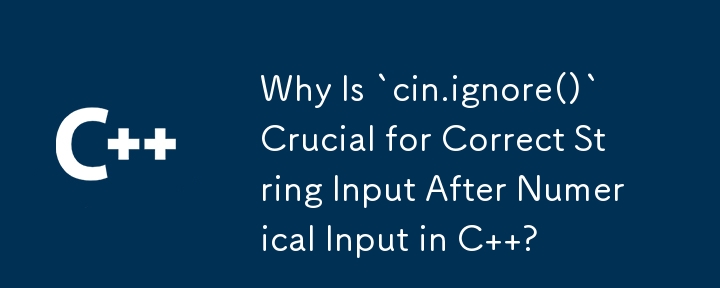

Unraveling the Enigma of cin.ignore() in C
When interacting with users in C programs, unexpected scenarios like skipping string inputs can arise. The seemingly innocuous cin.ignore() call holds the key to resolving such perplexing issues.
Why cin.ignore() Is Vital
When the user enters a number followed by a string, pressing the Enter key inserts a newline character ('n') into the input buffer. Subsequently, cin >> num; consumes the number but leaves the 'n' character in the buffer. When cin.ignore() is absent, cin >> getline(cin, mystr); inadvertently reads the 'n' character instead of the string input.
The cin.ignore() function solves this problem by ignoring a specified number of characters (256 in our example) or until it encounters a delimiter ('n' in this case).
Predicting the Need for cin.ignore()
Forecasting when cin.ignore() is required involves understanding the potential for leftover characters in the input buffer. Situations where it becomes essential include:
Example: Delving into the Code
Consider the provided C program:
#include <iostream>
#include <string>
using namespace std;
int main()
{
double num;
string mystr;
cout << "Please enter a number: " << endl;
cin >> num;
cout << "Your number is: " << num << endl;
cin.ignore(256, '\n'); // Ignore any remaining characters
cout << "Please enter your name: \n";
getline (cin, mystr);
cout << "So your name is " << mystr << "? \n";
cout << "Have a nice day. \n";
}Inserting the cin.ignore() call after cin >> num; ensures that the 'n' character is ignored, allowing the subsequent cin >> getline(cin, mystr); to correctly read the string input.
The above is the detailed content of Why Is `cin.ignore()` Crucial for Correct String Input After Numerical Input in C ?. For more information, please follow other related articles on the PHP Chinese website!
 What does b-side and c-side mean?
What does b-side and c-side mean?
 bios cannot detect solid state drive
bios cannot detect solid state drive
 How to use python library
How to use python library
 Rename the apk software
Rename the apk software
 Solution to failed connection between wsus and Microsoft server
Solution to failed connection between wsus and Microsoft server
 The main function of the arithmetic unit in a microcomputer is to perform
The main function of the arithmetic unit in a microcomputer is to perform
 How to solve the problem when the computer CPU temperature is too high
How to solve the problem when the computer CPU temperature is too high
 java export excel
java export excel




